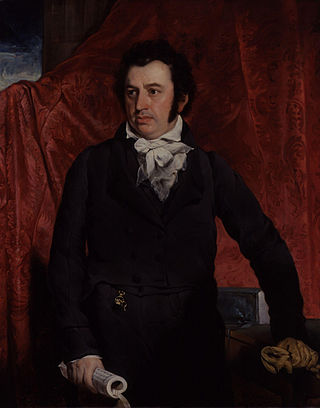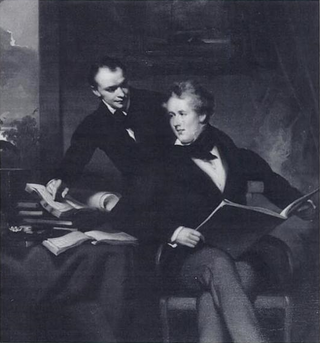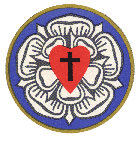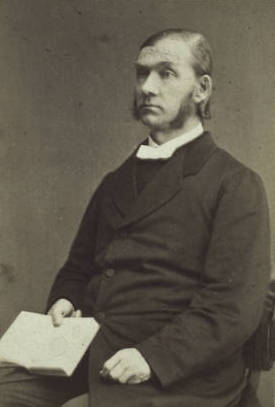Related Research Articles

Walter Henry Medhurst, was an English Congregationalist missionary to China, born in London and educated at St Paul's School. He was one of the early translators of the Bible into Chinese-language editions.

Karl Friedrich August Gützlaff, anglicised as Charles Gutzlaff, was a German Lutheran missionary to the Far East, notable as one of the first Protestant missionaries in Bangkok, Thailand (1828) and in Korea (1832). He was also the first Lutheran missionary to China. He was a magistrate in Ningbo and Zhoushan and the second Chinese Secretary of the British administration in Hong Kong.

Robert Morrison, FRS, was an Anglo-Scottish Protestant missionary to Portuguese Macao, Qing-era Guangdong, and Dutch Malacca, who was also a pioneering sinologist, lexicographer, and translator considered the "Father of Anglo-Chinese Literature".

John Robert Morrison was a British interpreter and colonial official in China. Born in Macau, his father was Robert Morrison, the first Protestant missionary in China. After his father's death in 1834, Morrison replaced him as Chinese Secretary and Interpreter to the Superintendents of British Trade in China. In 1843, he was appointed as Acting Colonial Secretary of Hong Kong and a member of the Executive and Legislative Councils, but died eight days later in Hong Kong from fever.

The Catholic Church in Indonesia is part of the worldwide Catholic Church, under the spiritual leadership of the pope in Rome. Catholicism is one of the six approved religions in Indonesia, the others being Islam, Protestantism, Hinduism, Buddhism, and Confucianism. According to official figures, Catholics made up 3.12 percent of the population in 2018. The number of Catholics is, therefore, more than 8.3 million. Indonesia is primarily Muslim, but Catholicism is the dominant faith in certain areas of the country.

Elijah Coleman Bridgman was the first American Protestant Christian missionary appointed to China. He served with the American Board of Commissioners for Foreign Missions. One of the first few Protestant missionaries to arrive in China prior to the First Opium War, Bridgman was a pioneering scholar and cultural intermediary, and laid the foundations for American sinology. His work shaped the development of early Sino-American relations. He contributed immensely to America's knowledge and understanding of Chinese civilization through his extensive writings on the country's history and culture in publications such as The Chinese Repository — the world's first major journal of sinology, which he began and edited. Bridgman became America's first "China expert." Among his other works was the first Chinese language history of the United States: "Short Account of the United States of America" and "The East-West Monthly Examiner". As a translator he contributed greatly to the formulation of America's first treaty with the Chinese government under the Qing Dynasty.
Berlin Foundling House was a German Protestant Christian missionary society that was involved in sending workers to China during the late Qing Dynasty.
English Presbyterian Mission was a British Presbyterian missionary society that was involved in sending workers to countries such as China during the late Qing Dynasty.

Since the arrival of Christianity in China, the Bible has been translated into many varieties of the Chinese language, both in fragments and in its totality. The first translations may have been undertaken as early as the 7th century AD, but the first printed translations appeared only in the nineteenth century. Progress on a modern translation was encumbered by denominational rivalries, theological clashes, linguistic disputes, and practical challenges at least until the publication of the Protestant Chinese Union Version in 1919, which became the basis of standard versions in use today.

Christianity is Indonesia's second-largest religion, after Islam. Indonesia also has the second-largest Christian population in Southeast Asia after the Philippines, the largest Protestant population in Southeast Asia, and the third-largest Christian population in Asia after the Philippines and China. Indonesia also has the second-largest Christian population in the Muslim world, after Nigeria, followed by Egypt. Indonesia's 29.4 million Christians constituted 10.47% of the country's population in 2023, with 7.41% Protestant and 3.06% Catholic. Some provinces in Indonesia are majority Christian. In Indonesia, the word Kristen refers to Protestantism, while Catholicism is referred to as Katolik. In the 21st century the rate of growth and spread of Christianity has increased, especially among the Chinese minority.

The Lutheran Church of China was a Lutheran church body in China from 1920 to 1951. It was established as a result of the consultations between the various Lutheran missionary bodies in China that was initiated during the China Centenary Missionary Conference held in Shanghai in 1907. The church survived as an organised body after the Chinese Communist Revolution but was absorbed into the state-backed Three-Self Patriotic Movement.
The Netherlands Chinese Evangelization Society was a Dutch Protestant Christian missionary society that was involved in sending workers to China during the late Qing dynasty. It was founded by Karl Gützlaff.

Johannes François Snelleman was a Dutch zoologist, orientalist, ethnographer and museum director. He was a son of Christiaan Snelleman and Sara Lacombe. Snelleman was married three times, to Josepha Hendrika Dupont (1860-1899), Catharina Johanna Elisabeth Augusta Inckel, and Theodora Maria Beun (1887-1964).
Medical missions in China by Catholic and Protestant physicians and surgeons of the 19th and early 20th centuries laid many foundations for modern medicine in China. Western medical missionaries established the first modern clinics and hospitals, provided the first training for nurses, and opened the first medical schools in China. Work was also done in opposition to the abuse of opium. Medical treatment and care came to many Chinese who were addicted, and eventually public and official opinion was influenced in favor of bringing an end to the destructive trade. By 1901, China was the most popular destination for medical missionaries. The 150 foreign physicians operated 128 hospitals and 245 dispensaries, treating 1.7 million patients. In 1894, male medical missionaries comprised 14 percent of all missionaries; women doctors were four percent. Modern medical education in China started in the early 20th century at hospitals run by international missionaries.
Hillebrandus Cornelius Klinkert was a Dutch Mennonite missionary and translator. He was born in Amsterdam and worked as an engineer in a machine factory at Rotterdam and on a Rhine barge before he contacted the DZV in 1851 with a request to be sent as a missionary. Klinkert was also known for his ability to translate the Bible into different dialects of Malay so that the Javanese people could access the Gospel, and completed his first entire translation at the end of 1878.
Joseph Kam was a Dutch missionary in Indonesia.

Jacobus Craandijk was a Dutch Mennonite teacher and minister who enjoyed using his spare time for walks while taking notes and drawing.

Sierk Coolsma was a Dutch Protestant missionary who wrote extensively on the Sundanese language. Born in the Netherlands, he became a missionary in his early twenties and arrived in the Dutch East Indies in 1865. First tasked to Cianjur, he studied Sundanese in more detail than his contemporaries, gaining an appreciation for the language. Further missionary activities in Bogor, begun in 1869, were a failure, and in 1873 he was tasked with translating the New Testament into Sundanese. Although the Sundanese people highly valued poetry, he did the translation in prose hoping that it would help readers entertain new ideas.

Rudolf Christian Friedrich Lechler, was a German evangelical Christian missionary to China, and is one of early leaders of the Basel Mission evangelizing to the Hakka people. Lechler spent 52 years in China. The Basel Hakka Mission that he administered was responsible for establishing over 51 mission stations, 56 schools with over two thousand members. Lechler is known today for administering to the early Hakka Christian church and, together with his mission coworkers, facilitated in the resettling of Hakka Christian communities fleeing from persecution to Southeast Asian countries of which new congregations such as the Basel Christian Church of Malaysia and the Lutheran Church in Malaysia and Singapore were subsequently formed. Lechler appreciated China's cultural heritage and was able to preach in several varieties of Chinese, including Mandarin, Hokkien, and Hakka, the last of which he knew well enough to help prepare a Romanized Hakka edition of the Gospel of Matthew and Gospel of Luke. Today the Hakka Christian community is estimated to have 150,000 members worldwide.
Events from the year 1844 in China.
References
- ↑ "Joseph Kam | e-MISI". Misi.sabda.org. Retrieved 2015-05-07.
- ↑ Gedenkboek uitgegeven ter gelegenheid van het honderdjarig bestaan van het Nederlandsch Zendelinggenootschap, Rotterdam: M. Wyt en Zonen, 1897 (197 pages)